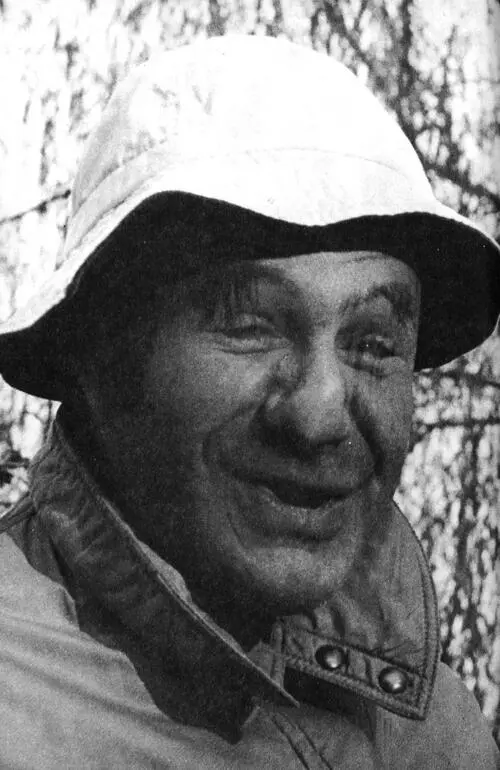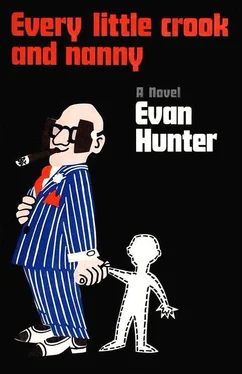“In that case, I am not in a position to reveal anything about the card game.”
“What card game?” Bozzaris asked.
“What card game?” Willie answered.
“The card game which,” Bozzaris said, “if your information about it is valuable to me, which I doubt that it will be, I might be willing to forget that you were pounding a man into the sidewalk, provided the man doesn’t drop dead in the hospital, in which case we will have, of course, a homicide on our hands.”
“Do I walk out of here meanwhile?” Willie asked.
“Tell me about the card game,” Bozzaris said.
“What would you like to know?”
“When?”
“Tonight. Eight o’clock sharp.”
“Where?”
“Celia Mescolata’s.”
“Blackjack?”
“Poker.”
“The stakes?”
“Very high.”
“How many players?”
“Six.”
“Mmmm,” Bozzaris said.
Somewhere on Capri, there was music.
They had taken an after-dinner stroll along the Via Quisisana, and then had stopped for a granita in the Piazzetta. Now, with the windows of their bedroom open to the soft night air, Stella tried to sleep while somewhere someone strummed a guitar and sang, she supposed, of unrequited love. It did not help that Carmine was snoring.
“Carmine?” she said.
“Mrmh.”
“Are you asleep?”
“Yes.”
“Carmine?”
“Mrmh.”
“I want to talk to you.”
“I’m asleep, I told you.”
“Carmine, I have a feeling that something terrible has happened to Lewis.”
“Nothing has happened to Lewis, go to sleep.”
“How do you know nothing has happened to him?”
“Nanny knows exactly where we are. If anything was wrong, she’d call. That’s how I know.”
“Still.”
“Go to sleep, Stella.”
“All right, Carmine. Good night, Carmine.”
“Good night, Stella.”
Stella listened to the guitar. She wished she understood Italian. Thirty years ago, when Carmine asked her to marry him, she had answered, “But I don’t understand Italian, Carmine.”
“What’s that got to do with love?” he said.
“Suppose we were out with some of your friends, and they began talking Italian?”
“I would tell them to talk English,” Carmine said.
“Yes, but would they do it?”
“They would do it,” he said, and gave a short emphatic nod that convinced her immediately. Carmine, who had been twenty years her senior even then, was true to his word. Whenever any of his friends began talking Italian in her presence, he would say, “Talk English.” As a result, Stella still didn’t understand Italian. Not that she minded, except on a night like this when she was so homesick, and a guitar player was singing songs she couldn’t translate.
“Carmine?” she said.
“Mrmh.”
“Carmine, I’m homesick.”
“We’ll be going home at the end of the month, go to sleep.”
“Carmine, aren’t you homesick?”
“No.”
“Don’t you miss Lewis?”
“Yes, but I’m not homesick.”
“Don’t you miss the house?”
“Only the darkroom,” he said. “Go to sleep.”
Mario Azzecca lived on Sutton Place South in an apartment building that had two doormen. The doormen were there so that none of the tenants would be burglarized in their sleep or mugged in the elevator. A third man ran the elevator, which meant that the bastions were well guarded against criminal assault at every hour of the day or night. Paulie Secondo, carrying fifty thousand dollars in cash and a round-trip airline ticket to Naples-via-Rome, arrived at Azzecca’s building at twenty minutes past eight. He was announced by the doorman and promptly asked to go right up, sir, elevator on the left, seventh floor, apartment 7G as in George.
Mario Azzecca was sitting in his living room waiting for the Delacorte fountain to go on. It went on every night at eight-thirty sharp, shooting a spray of water some hundred feet into the air, and was not turned off again until ten. From Azzecca’s living room, he could see clear across the East River to the southerly tip of Welfare Island, where Delacorte had erected the fountain for an estimated cost of three hundred thousand dollars. It was rumored that the fountain cost twenty-five thousand dollars a year to operate, and that it had been constructed for the amusement and amazement of United Nations delegates, but Mario Azzecca firmly believed it had been placed there for his pleasure alone. For hours on end, he would watch the display with unflagging interest. It was even better than watching the traffic on the Queensboro Bridge, which was also fascinating. He was, in truth, a trifle annoyed that Paulie Secondo arrived just a few minutes before the fountain was scheduled to erupt against the nighttime sky.
“Have you got the money?” he asked, somewhat brusquely.
“I have got the money,” Paulie said. Paulie spoke with a distinct Italian accent that was sometimes embarrassing. Being Italian himself, Azzecca did not mind dealing with other Italians, but he drew the line at outright greaseballs — unless they happened to be very high up in the organization, which Paulie Secondo happened to be. Reflecting on the hierarchy (while nonetheless keeping one eye on the southern exposure), Azzecca decided it might be judicious to adopt a more cheerful manner.
“I’m sorry we had to put you through all this trouble, Paulie,” he said. “But Ganooch needs the money right away.”
“No trouble,” Paulie said. “He told you why?”
“No.”
Paulie shrugged. “No matter. He wants the money, he gets the money.”
“There it goes,” Azzecca said, and looked at his watch.
“What?” Paulie said.
“The fountain.”
“Oh,” Paulie said, and peered through the window. “Nice,” he said, and turned away without interest. He reached into his jacket pocket and threw a bulging envelope onto the glass-topped coffee table. “Fifty thousand,” he said. “In hundred-dollar bills, okay?”
“Fine,” Azzecca said.
Paulie threw an airlines folder onto the table beside the envelope. “One ticket New York-Rome, Rome-Naples,” he said. “And return.”
“What airline?” Azzecca asked.
Paulie raised his eyebrows. “What airline you think?” he said.
“Who do you want us to send?” Azzecca asked.
“It’s done,” Paulie said.
“What do you mean?”
“On the ticket. It was necessary to give a name.”
“Who?”
“Someone of little importance. Something goes wrong, we want no connection, capisce ?”
“Yes, of course.”
“Get the ticket and the money to him, tell him to be on the Alitalia plane tomorrow night at ten o’clock. He will be met in Naples on Saturday at two.” Paulie looked through the window again. “How long does that thing shoot water?” he asked.
“Until ten.”
“Looks like somebody laying on his back and taking a piss in the air,” Paulie said.
Azzecca picked up the airlines folder, pulled out the ticket, and looked at the passenger’s name.
“Ah yes,” he said, “Benny Napkins.”

Carmine Ganucci could not fall asleep again.
The more he thought about the deal Truffatore and Ladruncolo had proposed, the more it stunk. To begin with, despite his fancy maneuvering, the profit was still very low. On an investment of fifty thousand dollars, he would earn a profit of thirty thousand dollars when the gold medallions were delivered to New York. If the medallions were delivered. And if they were really gold. Because if they weren’t, he’d lose the whole fifty grand outright and besides have cleanup work to do in Naples, which meant hiring people you didn’t know and trusting your business to strangers. But even if the medallions were really silver-plated gold, and even if they were delivered to New York, he would have all the trouble of melting them down and then getting rid of the gold, which seemed like an operation for a jeweler and not a respectable businessman. If he loan-sharked that same amount of money, the interest would be twenty per cent a week. At the end of four weeks, he could realize a profit of forty thousand dollars, ten thousand more than the Naples deal would bring. And it was more convenient to be dealing with people in New York, where if they didn’t pay back the money, or if something else went wrong, you could always break their heads. And also, suppose those two Neapolitan morons got busted for bringing dope into Italy inside pearls, and suppose it got traced back to Carmine Ganucci, that he was responsible for the whole transaction, having provided the fifty G’s that made the deal viable, so then he would be connected to an international dope smuggling operation, wonderful. And also, was it a sin to melt down medallions of the Virgin Mary?
Читать дальше













